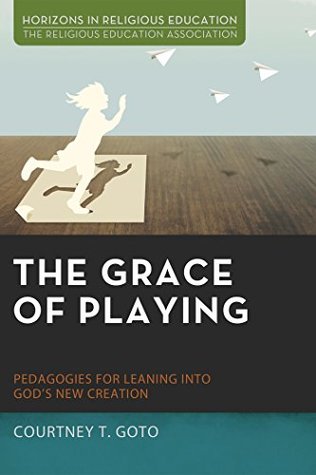Kindle Notes & Highlights
Read between
September 17 - September 21, 2021
The meeting is what interrupts or decenters, graciously opening us up to grace.
The language of playing lends insight about how God is revealed unexpectedly in the midst of relating to one another, though we may not consciously seek it. One
When abundance, love, and grace that the Bible conveys are lived with others, this is what is revelatory. Playing is one means by which we experience Christ’s way as liberating, surprising, timeless, and timely.
As some of us play in Christian communities, we sense more fully ourselves as an interrelated people who need one another to play at/in the new creation. Not
At least at first, the relationships involved in playing are decentering. Yet paradoxically, they are ultimately the means by which learners are able to tolerate and maybe even be inspired to welcome decentering. As people relate to one another in more authentic and spontaneous ways in playing, this itself is a departure from the norms of non-playing.
Pedagogies of playing at/in God’s new creation place high demands on learners, but also on the teacher(s). The risks to the religious educator in teaching through pedagogies of playing are real but perhaps not unfamiliar. In
However, more often than not and to one degree or another, we live in worlds of need, where true self is hiding and waiting, longing to be sought, found, and lovingly enticed to emerge more frequently. In houses of worship, in lecture halls, and in cubicles, faithful people (including ourselves at times) spend more time hiding our true thoughts and feelings, numbed out, and conforming to what is expected rather than leaning into the reality to which God’s new creation beckons us.
Despite the high level of human participation in revelatory experiencing, what is revealed is not revealed from teacher to learner but between teacher and leaner and among all members of the learning community.
A good enough religious educator can provide hospitality and support needed for the creative process. At the same time, a learner can show up with openness, hope, and the courage to reach for what is good but not fully known.
Playing that forms Christians in faith involves risking oneself for the love that God first offered to us as God’s own, for love that yearns for healing and transformation, and for love that binds human beings to one another. We play not for the sake of having experiences. We play for the sake of experiencing that which reveals us as able to be loved and to love more and more fully.
Playing for love’s sake is a different rationale than the reasons why other communities play together.
In response to pedagogies of playing, learners are summoned to be with and for one another in ways that lean toward loving—not only loving one another but also the Spirit that makes all things new. Unlike
Likewise Jesus did not condemn people he met as sinners, he related to them deeply and authentically. He met them where they were and drew them out in ways that were healing and surprising. Playing affirms the goodness of creating together, focusing on possibilities that might be embraced as they emerge in between players. Spirit summons within us hope and love of neighbor, stranger, and beloved.


